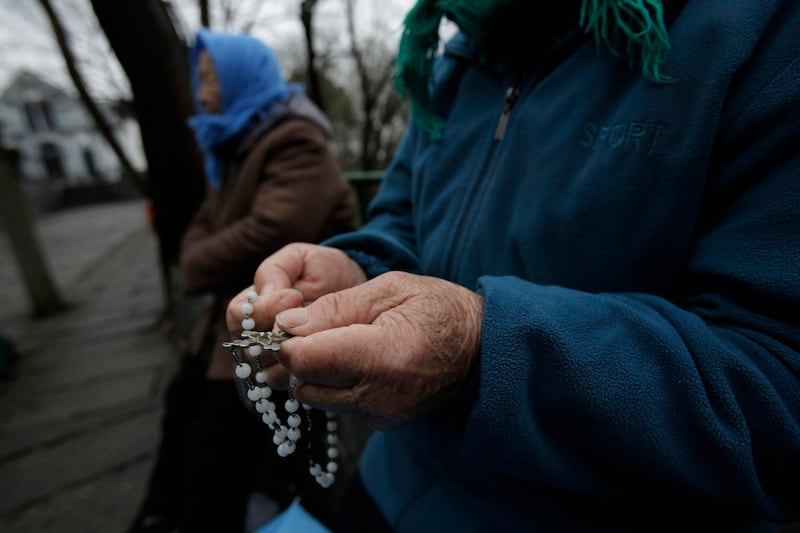The ruling Chinese Communist Party has appointed a new bishop of Shanghai without approval from the Vatican, in what critics say is a breach of a controversial agreement on the appointment of bishops signed in September 2018.
“Bishop Shen Bin, until now Bishop of Haimen, was installed in the Diocese of Shanghai, China, this morning,” the Vatican News website reported.
“The Holy See had been informed a few days ago of the decision of the Chinese authorities,” it quoted Holy See spokesman Matteo Bruni as saying.
“I have nothing to say about the Holy See’s assessment of the matter for the time being,” Bruni said in remarks reported by several media outlets including Reuters.
The Shanghai Diocese said in a statement dated April 4 on its website that around 200 people attended the inauguration ceremony, including all of the diocese’s priests and nuns.
“Bishop Shen Bin said that he will continue to carry forward the fine tradition of patriotism and love of the Catholic Church in Shanghai, adhere to the principle of independence and self-government, adhere to the direction of Catholicism in China, and better promote the healthy tradition of Catholic evangelism in Shanghai,” the statement said.
‘Without the pope’s mandate’
The statement refers to the ongoing "sinicization" of all religious traditions under Communist Party supreme leader Xi Jinping, who regards Christianity as a potentially destabilizing foreign import, according to a report in the Catholic news site AsiaNews.
The report cited Vatican sources as saying that the appointment was “unilateral,” and made without papal approval.
“Indirect confirmation also comes from the Catholic faithful in China, who have expressed sadness at the installation, which they say came without the pope’s mandate: a source of great upset for the Catholic community in Shanghai,” it said.
The 2018 Sino-Vatican agreement on the appointment of bishops, which was renewed in 2020 and 2022, requires the approval of both Beijing and the Vatican before a new bishop can be appointed.

A Catholic priest in the northern province of Shanxi who gave only the surname Shen declined to comment on the appointment when contacted by Radio Free Asia on Wednesday.
“I don’t know about this, and don’t want to talk about it,” he said, before hanging up.
A Beijing-based Catholic who gave only the surname Liu said the Shanghai appointment had left many Chinese Catholics dissatisfied, but they wouldn’t dare to say so.
“All churches are run by the government, which wants us all to be patriotic as well as religious,” Liu said.
A Catholic from the eastern province of Jiangsu who gave only the surname Zhong agreed.
“They just ignore the authority of the Pope and the Vatican,” Zhong said. “This appointment of bishop [Shen] shows that the Chinese Communist Party is ignoring the Sino-Vatican agreement, and the authority of the Vatican when it comes to the appointment of bishops.”
“The church has no autonomy,” Zhong said. “Some of my friends who are Catholic priests often express their dissatisfaction with this in private.”
He said many Catholics in China remain loyal to Rome, and take issue with any role for Beijing in the appointment of bishops.
Predecessor had been under house arrest
Shen’s appointment comes after his predecessor Ma Daqin, who was recognized by both Beijing and the Holy See, was placed under house arrest for resigning from the Communist Party-backed Catholic Patriotic Association immediately after his ordination.
Ma later rejoined the government-backed body, but with a record now tainted by the incident, AsiaNews said.
It said the Vatican would have preferred Joseph Xing Wenzhi to lead the diocese of Shanghai, but that he had resigned in 2012 for reasons that have never been made clear.
The Catholic Church-linked newspaper Milan Avvenire Online said "concerns of social control and public order" shouldn't be allowed to dominate decisions on new appointments.
“The voice of Rome must be adequately listened to,” the paper said. “Sometimes one gets the impression that in China there is a ... lack of understanding of the universal nature of the Church.”
It said recent changes at the top of the Communist Party’s outreach and influence arm, the United Front Work Department, could have been behind the decision to move ahead unilaterally with the Shanghai appointment.
Translated by Luisetta Mudie. Edited by Matt Reed.
